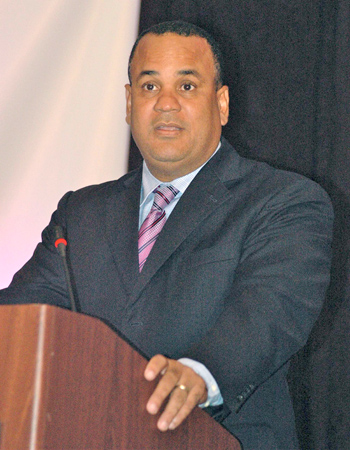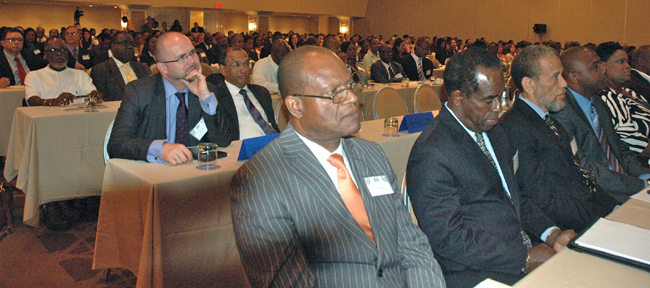From:TheBahamasWeekly.com
Halkitis explains how VAT saves the Bahamian Economy
By Gena Gibbs, BIS
Nov 12, 2013 - 12:46:00 PM

State Minister for Finance Michael Halkitis. (BIS Photo / Gena Gibbs).
|
Nassau, The Bahamas -- Garnering support from accounting professionals to direct the sustainability of the Bahamas Financial sector, the Ministry of Finance explains how the introduction of the valued added tax (VAT) would put The Bahamas back into a more favourable economic standing. Minister of State for Finance Michael Halkitis, recognised the Bahamas Institute of Chartered Accountants (BICA) for continuing to provide education to keep accountants aware of current trends.
“It is vital that our financial services professionals remain on the cutting edge of the industry, so that The Bahamas continues to remain relevant in the context of both the Caribbean Region, and the world at large," he told BICA members Nov. 11, 2013, as they celebrated the beginning of Accountants Week, at the Sheraton Cable Beach Resort under the theme “Broadening Our Expertise To Support The Changing Economic Environment.”
He applauded BICA in its dedication in working to ensure that Bahamian accountants are not left behind.
“As we are all well aware, over the past year or so, there has been a lot of talk about the introduction of the Value-Added Tax in The Bahamas -- on both the positive and potentially negative effects the implementation of this tax is likely to have on various sectors of the Bahamian economy. The Government has been working tirelessly to ensure that all of the potential impacts of this tax are considered and that the net positive impact by far outweighs any negative impacts.”
Minister Halkitis made a case to the accountants to support the government’s need for tax reform by broadening the tax base, which would provide government with the revenue it needs to meet its fluctuating expenditures.
“The government has also been diligent in looking at ways it can make the transition to VAT, as smooth as possible for all sectors of the economy, to ensure that no group is forced to unfairly bear more of the burden of compliance. A key pillar of these efforts has been to ensure that all affected groups are equipped with all of the necessary information on exactly how the VAT will affect their industry and to ensure that they are given the tools needed to effectively prepare themselves,” said Minister Halkitis.
Minister Halkitis said that as the July 1, 2014 date for the implementation of the VAT, is approached, it is important that all affected groups are educated on why this reform is needed in the first place; and what the potential effects would be of continuing down the current path. He explained why the additional revenue is necessary at this point in the country’s history and why broadening the tax base guarantees the nation’s economic stability going forward.

Bahamas Institute of Chartered Accountants (BICA) members listen to Minister Halkitis make a case for VAT.
(BIS Photo / Gena Gibbs).
|
“The Bahamas has always enjoyed a very liberal tax environment; characterised by the absence of key taxes upon which other major economies rely. The most notable absences have been taxes on capital gains, corporate earnings, personal income, sales, inheritance, and dividends. This being the case, we have largely relied on a very narrow range of revenue sources: principally customs duties, real property taxes and stamp duties. What this means is that our country continues to rely on very few revenue sources to finance a very wide range of public services,” said Minister Halkitis.
“Furthermore, our current system is one where the burden of taxation falls on a relatively narrow base of goods and makes us particularly vulnerable to economic shocks. While these revenue sources have been sufficient to sustain positive real growth in the Bahamian economy in decades past, the effects of the worldwide recession put enormous pressure on the government to spur economic growth, which put additional strain on our country’s resources.”
Minister Halkitis said this pressure necessitated increased borrowing to finance injections into the economy and resulted in a steady rise in the debt-to-GDP ratio.
“Stats, according to IMF predictions, if left unchecked, the central government debt is projected to reach 62 percent of GDP by Fiscal Year 2016/17. Adding the debt owed by non-financial public corporations, the total public sector debt is projected to increase to about 76 percent of GDP by Fiscal Year 2016/17,” said Minister Halkitis.
“At those levels, and as a consequence, higher levels of public funds being directed towards debt-servicing, significantly fewer resources would be available to finance critical investments needed for our country's economic growth.
Minister Halkitis alluded that such high debt levels have implications for the country's continued ability to adequately service that debt and negatively affects the ability to attract investment and to grow. He said that reducing the debt ratio over the medium term is therefore an imperative for The Bahamas.
“Furthermore, Revenue-to-GDP in The Bahamas is low by regional comparison and the tax base is narrow while the growth sectors of the economy — tourism and financial sectors — generate a small proportion of net revenue,” said Minister Halkitis.
“These two factors: -rising debt-to-GDP and comparatively low revenue-to-GDP, have highlighted the critical need for a broadening of the tax base in The Bahamas. A core objective of tax policy must be to raise sufficient tax revenues to finance public expenditure while maintaining sustainable public debt ratios.”
Minister Halkitis said that without attempting to reform the tax structure in The Bahamas, there would be the real potential for an unchecked rise in the country’s debt and a decreased flexibility to borrow in cases of emergencies-meaning increased vulnerability to shocks like hurricanes and sudden contractions in foreign economies, on which The Bahamas depends for tourists.
“Failure to raise revenues now has the potential to result in additional credit downgrades and eventual loss of access to credit markets. What this will inevitably mean for The Bahamas is a much higher tax increase, larger reductions in spending when the situation is eventually addressed,” said Minister Halkitis.
“Another important consideration when it comes to the need for tax reform is The Bahamas’ upcoming accession into the World Trade Organisation (WTO). Accession to the WTO will immediately compel The Bahamas to lower its average tariff rates to be consistent with other WTO members and to encourage global trade. While The Bahamas cannot afford in the long run to remain on the outside of such global trade agreements, lowering the tariff rates, without any attempt to raise revenues in other ways, would significantly reduce our country’s revenue. A shift in the way The Bahamas approaches taxes is therefore crucial in order to place our country in a strong economic position.”
Minister Halkitis said these eventualities were considered as the value Added Tax was introduced: with the aim of improving the country's fiscal stance and positioning The Bahamas’ economy to be one of growth and opportunity going forward. He repeated that broadening the tax base will insure, not only that the country has more revenue coming in, but spreading out the tax burden will allow us to tap into more sectors of the economy, when demand falls in key revenue generating industries. He said this will improve The Bahamas’ ability to weather economic shocks and to bounce back more quickly in times of recession.
© Copyright 2013 by thebahamasweekly.com -